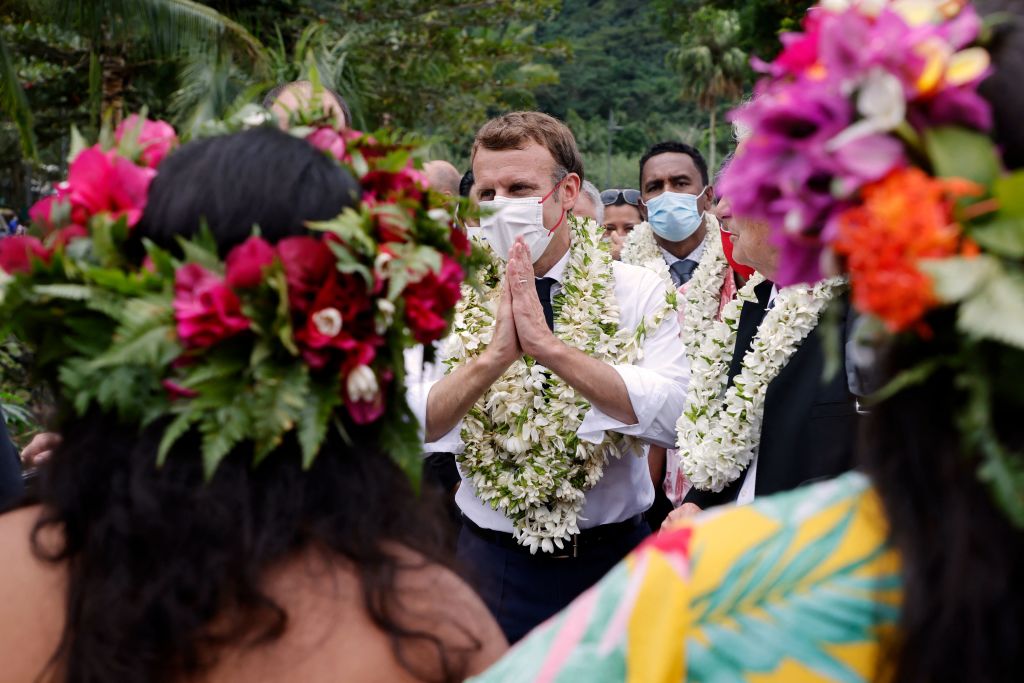Macron’s Indo-Pacific vision: ‘Woe betide the small and isolated’

In a speech on 28 July during a visit to French Polynesia, French President Emmanuel Macron underlined the benefits of French protection in the region, within the framework of France’s Indo-Pacific strategy and with New Caledonia’s impending independence vote in mind. His protection message was directed to leaders of France’s territories in the Pacific and beyond, and indeed to Pacific island leaders generally. Macron invoked France’s nuclear-deterrence capability (based on testing conducted for decades in the Pacific over regional opprobrium) as a plus for France and French Polynesia, and implicitly for the wider region.
France bases its Indo-Pacific strategy on its sovereign presence in the two oceans through its territories, so the timing and location of Macron’s presentation are not surprising. His visit came just months before France’s pre-eminent Pacific possession votes on independence, on 12 December 2021. New Caledonia’s final vote in a three-vote process will be decisive. The previous two referendums, while favouring staying French, saw a steady, indigenous-based, increase in support for independence from 43.3% in 2018 to 47.6% in 2020.
Macron had chosen to announce France’s Indo-Pacific strategy when he visited Noumea to open the referendum process in May 2018, and stressed the importance of a French New Caledonia within that strategy. His Papeete speech followed the public release of a French paper outlining the consequences of ‘yes’ and ‘no’ votes for New Caledonia’s future and proposing extensive negotiation with France regardless of the referendum outcome. Independence parties, while accepting some partnership with France in the event of independence, have been non-committal on the detail.
In Papeete, Macron sharpened his message to New Caledonians. He addressed them early in his remarks. Stressing that the choice is for them to make, he repeated his 2018 comment that ‘France would be less beautiful without New Caledonia’. By the end of his speech, he left little doubt that a vote for independence risked forgoing the power and protection that France offered. As such, it was a message to New Caledonia and French Polynesia, where there’s also an independence movement.
Macron referred to slow implementation of his own pledges to resolve claims for compensation by victims suffering health effects from France’s nuclear testing in the Hao and Mururoa atolls. Reaffirming his intention to have more cases brought to justice, he referred at length to this recent history, which is sensitive and painful not just for French Polynesians but broadly in the region. It was Pacific Islands Forum countries that led an ultimately successful campaign of international condemnation of French nuclear testing from the 1960s. France ceased testing in 1996.
Macron acknowledged that France had chosen to carry out its nuclear testing in French Polynesia (after testing sites in Algeria were lost in 1962 following a long independence war) because the sites, ‘lost in the middle of the Pacific’, meant fewer consequences than if they had been conducted in metropolitan France. Denying that scientists and military personnel had lied (‘the military had bathed in the same water’), he acknowledged the imperfect assessment of risks, based on imperfect knowledge. He pledged to release all files—except those that ‘could put our deterrence at risk’.
Macron warned of the perils of small Pacific islands losing the protection that a nuclear power like France could offer, in a region where ‘confrontation between two major world powers was playing out’ and where states were subject to wars and pressure for influence that would grow. To be French in this context was an opportunity, he noted, because France had an Indo-Pacific strategy, one of freedom and sustainable, ‘blue’ economic and digital development, preserving biodiversity and the sovereignty of everyone in the Pacific. France had allies in this strategy and had built unique partnerships with each: Australia (an ‘essential partner’), New Zealand, India and Japan.
But, Macron said, ‘I say very clearly, in the time to come, woe betide the small, woe betide the isolated, woe betide those who will undergo influence and attacks from hegemonic powers who will come to seek their fish, their technology, their economic resources. I say clearly: Here is Polynesia. But here, it is France. And you will be protected.’
He noted what was happening in the region, ‘in Vanuatu’ and elsewhere, and said that in the face of ‘siren voices’ promising exotic projects and investment, ‘Let us attach ourselves to the mast, and hold on.’ France would be there to protect French Polynesia and its sovereignty.
Whereas Pacific countries now see France as a constructive regional partner, they have also fully supported self-determination in France’s Pacific territories. None has so far commented on the speech. As for Australia, while it sees France as a valued strategic partner in the Indo-Pacific, it has not taken a position on the outcome of New Caledonia’s referendum process and will respect the result of the vote.